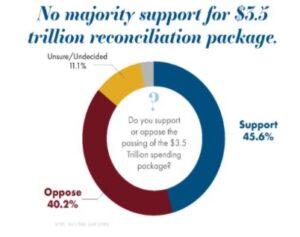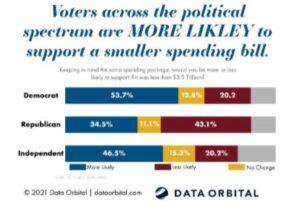From Data Orbital
Data Orbital is pleased to announce the results of its latest statewide, live-caller survey of registered voters. The survey was conducted from September 30th to October 1st.
The survey focused on voters’ views of the proposed $3.5 trillion budget reconciliation bill and sought to gauge their position on the overall size of the spending package.
The $3.5 trillion budget reconciliation bill does not reach majority support with Arizona voters. Overall, less than half (45.6%) of all voters expressed support for the spending bill. Independents, in particular, do not support the bill, with only 22% of Independents strongly supporting it and 18% having no opinion.

However, voters expressed that they may be open to some form of the bill, but only with a smaller price tag. A majority of Democrats (54%) as well as sizeable portions of Independents (46%) and Republicans (34%) said they would be more likely to support the bill if it came at a lower cost. In addition, of those who either “somewhat support” or “somewhat oppose” the bill as it stands, almost 60% would be more likely to support the bill if it was less than the current price tag of $3.5 trillion.
Pollster George Khalaf said, “These results clearly show why Senator Sinema is holding out against pressure from the progressive left. She is listening to the constituency of voters that elected her in 2018 – moderate suburban voters. It is clear Arizona voters are hesitant about the reconciliation package at its full $3.5 trillion price.”

This poll of 550 registered voters was conducted through a live survey that collected 60% of the results from landlines and 40% from cell phones. It has a margin of error at plus or minus 4.18% with a 95% confidence interval. Respondents were weighted on a number of different demographic figures based on registration data from the Arizona Secretary of State. The poll was conducted from September 30 – October 1, 2021. All non-released questions would not reasonably be expected to influence responses to all released questions. The questions released are verbatim from the survey provided to respondents. Toplines and demographic data can be found here. Crosstabs for this survey can be found here.

